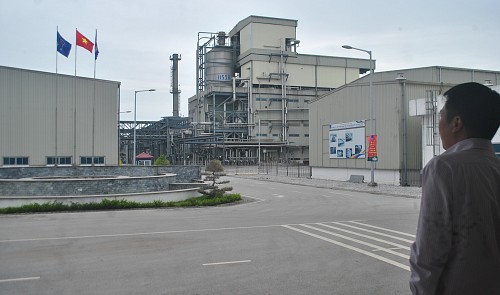A little more than a year after starting operations, a multimillion-dollar polyester yarn making plant in northern Vietnam has suffered a run of losses and is already at the brink of bankruptcy.
The US$325 million Dinh Vu plant (PVTex) in Hai Phong City has had to temporarily close three times since its operations started in May 2014.
Tuoi Tre (Youth) newspaper reporters could only find a couple of guards sitting at the facility’s gate during a visit to PVTex on October 12, while workers were nowhere to be seen.
The plant, developed by state-run oil and gas giant PetroVietnam, is in its second temporary shutdown this year, and around 1,000 employees have been asked to stay home.
The facility was closed in September and is not expected to resume operations until December, so employees are “considering finding another job,” one of a few maintenance workers Tuoi Tre could find at the plant said.
Inaccurate data and forecasts
PetroVietnam holds a 75 percent stake in the costly plant, which was built in a bid to help Vietnam’s textile sector rely less on imported raw materials.
PVTex was hoped to meet 40 percent of domestic demand for fiber, and 12 percent for yarn, according to PetroVietnam.
But the grossly inaccurate feasibility report and uncompetitive production costs have ruined all expectations of the oil and gas behemoth.
PVTex incurred VND1.08 trillion ($48.21 million) worth of losses as of the end of last year, as it failed to cover costs, with local textile firms preferring imported materials for higher quality and cheaper prices.
The deficits amounted to VND1.73 trillion ($77.23 million) as of March 31, with the plant only managing to sell 23,000 out of 32,000 metric tons of yarn it produced.
Vietnam, which needs around 400,000 metric tons of polyester yarn a year, last year imported 246,000 metric tons at a total cost of $405.8 million, mostly from Taiwan, Thailand and mainland China.
The import price averaged $1,237 a metric ton, according to customs data.
In the meantime, the average cost price of yarn made by PVTex in the last three months of 2014 was $1,434 a metric ton, or $197 higher than the import price.
The plant has never run at its full capacity of 145,000 metric tons a year, barely reaching 50 percent or lower.
But even when the facility is in full swing, its production cost is still $53 a metric ton higher than the imported rate.
However, price is not the only thing that matters.
“The quality of PVTex yarn is unstable, which is equally important to textile firms as product price,” a textile expert told Tuoi Tre.
The feasibility report of the PVTex project has been proven to contain many inaccurate forecasts, which have contributed to the plant’s beleaguered operations.
For instance, while the feasibility report says the plant needs only $4.69 million to cover annual power costs, the real expense is as much as $12 million.
The estimated expenses to buy chemicals and other sub-materials have been set at $500,000, whereas the actual costs are $11 million.
Other expenditures, such as fuel and labor wages, are also much higher than estimates and the plant has had to recruit 1,000 employees instead of 500 as stated in the feasibility report, a PetroVietnam official admitted to Tuoi Tre.
PVTex is expected to recoup investment after eight years and eight months in operations, but it turns out that the real time frame is 22 years and ten months.
Calling for preferential treatment
State-run Vietnamese firms usually call on the government to grant them favorable treatment whenever they are in trouble, and PetroVietnam is no exception.
The oil and gas giant has asked the Ministry of Finance to levy import duties on polyester yarn and set a quota for such imports, while giving PVtex tax and fee incentives.
PetroVietnam also demanded that the Ministry of Industry and Trade rule that all local textile firms must use PVtex products if they want to access bank loans or other incentives.
Such requests have been deemed “groundless” and “going against WTO commitments” by the finance and trade ministries.
The Ministry of Industry and Trade, however, did encourage local firms to prioritize using PVTex products, whereas its finance counterpart has increased the import duty for polyester yarn from zero to two percent.
Still, PVTex is in “a dangerous financial situation and even faces bankruptcy,” the trade ministry has warned.
























































